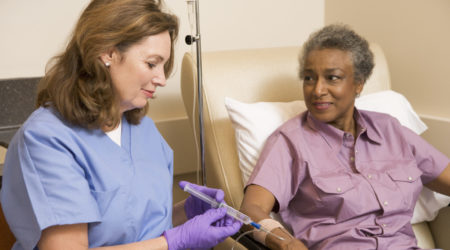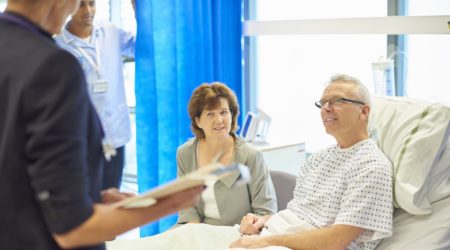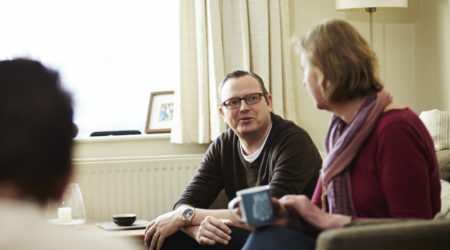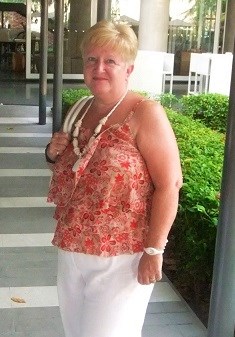

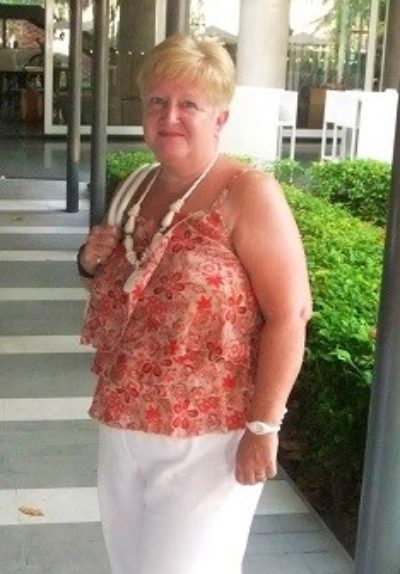

Sue G
Sue, 57, diagnosed in 2013 with operable pancreatic adenocarcinoma
In December 2013 at the age of 57 I presented to my GP with symptoms of Jaundice – orange coloured urine, the whites of my eyes were yellow and my skin had a yellow tinge. I did not have upper back pain or stomach pains, the only other symptom I had was recurring indigestion which I put down to eating late or eating fatty food. I was referred for a blood test and an ultrasound scan, both of which I had within 2 days. The scan did not show anything of significance but the blood test revealed problems with my liver.
I promptly took my self down to A&E and was admitted to hospital that day, so 4 days after my initial visit to my GP.
I was treated for jaundice and underwent a CT scan, after which I was told that I probably had a tumour constricting my bile duct which could be malignant but they could not see it on the CT scan. I was then transferred to another hospital to have an ERCP procedure to cannulate the bile duct, this failed and was extremely painful. I then had a PTC, an external drain was put in my bile duct and finally a rendezvous procedure to place a metal biliary stent internally. I was discharged from hospital on 31st December 2013 and referred to another hospital for further tests to be carried out in January 2014.
I then had an endoscopic ultrasound procedure which finally revealed some abnormal tissue surrounding the bile duct and in the pancreas. A whipple’s operation was then scheduled for the middle of February 2014. My consultant made it very clear that I had to be in good physical and mental condition before he would proceed. In other words I had to exercise daily and adopt a very positive attitude that would enable me to survive the rigours of the surgery and recovery. The surgery went well, 3 days in intensive care and 2 weeks in hospital. I was discharged with a stapled wound of approx 11 inches across my midriff. I was unable to lie on my side, sit up unaided or eat properly but my cancer had been removed successfully. I had daily visits from the district nurses to dress my wound which went on for 2 and a half months.
I then began a 6 month course of Gemcitabine chemotherapy, once a week for half an hour, 3 weeks out of 4. Thankfully I am coming to the end of chemo, with only 3 more sessions to go. I have felt very tired, and nauseous but anti sickness medication controls this. I have not lost my hair although it has gone thinner and grey as I was advised not to dye my hair as I usually do as hair does become weaker during chemo.
I take enzymes with my food to help digest what I eat due to reduced function of the pancreas but this is a small price to pay for surviving the op and the recovery. Hopefully my cancer will not return, I try to be positive and surround myself with people, friends and family who support me in this endeavour. I try not to let the people who voice their concerns about my future get me down and while I am aware of the risks, I constantly plan short breaks in this country when I have a week off chemo and I am currently planning an extended holiday abroad for January 2015. When I asked my oncologist if it was ok to go in January, he said he wished he could say that I had to take a consultant with me and he could be free, which raised a laugh from me.
I have obviously had my low points but I do feel I have been and continue to be very lucky that they caught my cancer early and hopefully I will recover to full health in the near future. There is a lot more I could say about the early days following surgery but I would encourage other survivors to ask me questions good and bad.
September 2014


